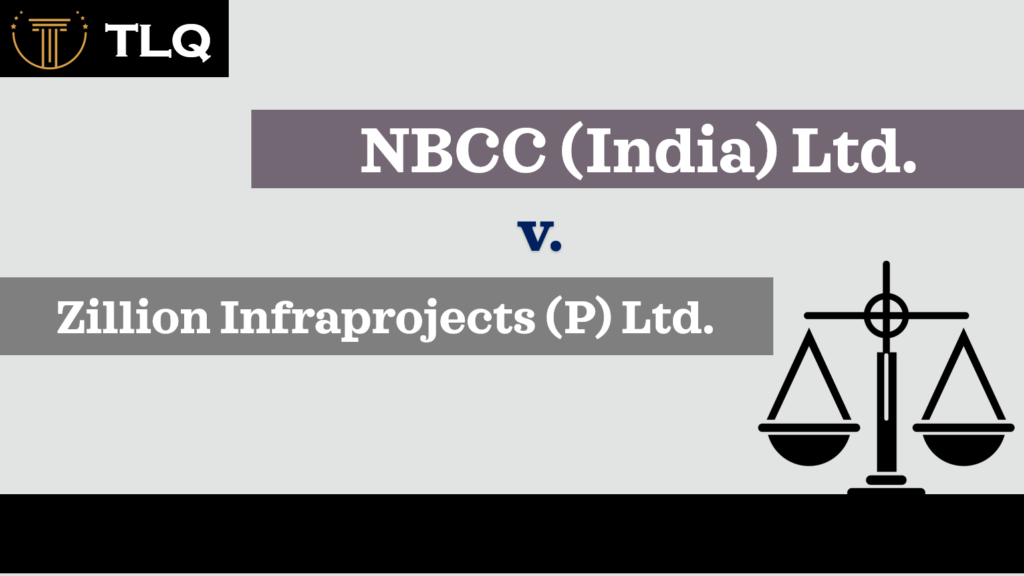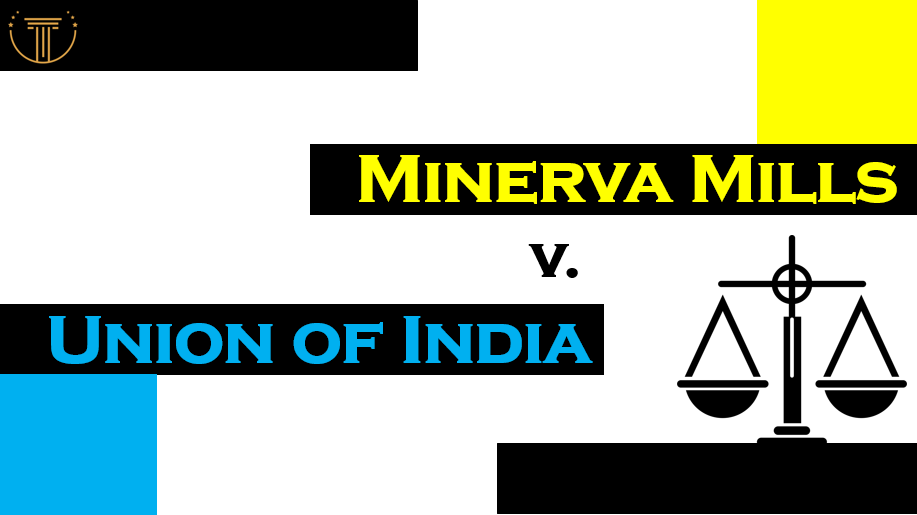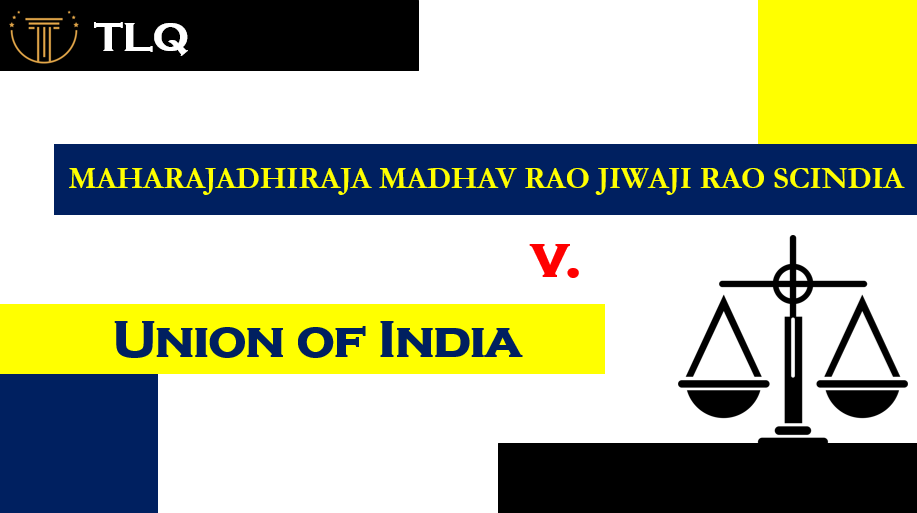Published On: 22nd June, 2024
Authored By: Subhechcha Mukherjee
Shyambazar Law College
Facts:
Arbitration has emerged as a popular mechanism for resolving disputes, offering a more expedient and confidential alternative to traditional litigation. However, the efficacy of arbitration hinges on the clear and unequivocal inclusion of arbitration clauses in contractual agreements.
A recent civil appeal filed by NBCC (India) Limited has brought to light the intricacies surrounding the incorporation of arbitration clauses, particularly in cases involving multiple contracts referencing each other. The judgment rendered by the division bench of BR Gavai and Sandeep Mehta, JJ. offers valuable insights into the principles governing arbitration clause incorporation in contractual agreements.
This contractual arrangement emerged following a tender process initiated by NBCC, as evidenced by the Tender Documents issued on November 3rd, 2006[1]. In response to this tender, Zillion Infraprojects submitted its Techno Commercial Bid, leading to the issuance of a Letter of Intent (L.O.I.) on December 4th, 2006, by NBCC, awarding the contract to Zillion Infraprojects.[2]
Subsequent disagreements between NBCC and Zillion Infraprojects prompted the latter to invoke arbitration as per the terms of the contract. Despite Zillion Infraprojects’ attempts at initiating arbitration proceedings, NBCC did not respond, resulting in Zillion Infraprojects filing an application under Section 11(6) of the Arbitration & Conciliation Act, 1996, seeking the appointment of a Sole Arbitrator.
The High Court of Delhi responded to Zillion Infraprojects’ application by appointing a Sole Arbitrator to resolve the dispute between the parties. In response to this decision, NBCC filed appeals challenging both the interim order and the final judgment and order issued by the High Court.
Legal Issues:
The central legal issue in this case revolves around the interpretation and incorporation of the arbitration clause from the Tender Documents into the contract between NBCC and Zillion Infraprojects. Specifically, the key question is whether the reference to the Tender Documents in the L.O.I. was sufficient to incorporate the arbitration clause into the contract between the parties, thereby enabling Zillion Infraprojects to initiate arbitration proceedings.
The judgment delves into several key legal principles governing the incorporation of arbitration clauses:
- Specific Reference Requirement: The court emphasized that a mere general reference to the terms and conditions of a previous contract is insufficient for the automatic incorporation of its arbitration clause into subsequent contracts. Specific mention or reference to the arbitration clause is imperative for its inclusion.
- Intent to Incorporate: The court highlighted the importance of demonstrating the parties’ intention to incorporate the arbitration clause into the contract. Section 7(5) of the Arbitration Act mandates a conscious acceptance of the arbitration clause as part of the contract.
- Distinguishing ‘Reference’ from ‘Incorporation’: The judgment distinguishes between cases of ‘reference’ and ‘incorporation.’ While a general reference may not suffice for incorporation, it can establish the context for incorporating specific clauses. In the present case, Clause 7.0 of the Letter of Intent clearly stipulated that disputes must be resolved through civil courts in Delhi, precluding arbitration.
- Single-Contract vs. Two-Contract Case: The court elucidated the distinction between single-contract and two-contract scenarios. In the former, a general reference to standard forms may suffice for incorporating arbitration clauses, as established in the Inox Wind Ltd. v. Thermocables Ltd. case. However, in the latter, specific reference to the arbitration clause is indispensable.
Arguments:
NBCC’s Arguments:
The argument presented by NBCC (India) Limited revolves around the interpretation of the contractual terms, particularly those outlined in the Letter of Intent (LOI) and the tender documents. NBCC contends that the terms and conditions specified in the tender documents, which were explicitly referenced in the LOI, form an integral part of the agreement between the parties. They assert that Clause 7.0 of the LOI unambiguously designates the jurisdiction for dispute resolution to the civil courts of Delhi alone, thereby precluding arbitration.[3]
Furthermore, NBCC argues that any reference to the terms and conditions of the tender documents must be construed in a manner that preserves the integrity of the jurisdictional clause specified in the LOI. They maintain that unless the LOI specifically provides for the incorporation of the arbitration clause, a mere reference to arbitration proceedings would not be permitted under the provisions of the Arbitration Act.
In essence, NBCC’s argument revolves around the interpretation of the contractual provisions, emphasizing the clarity and specificity of the jurisdictional clause in the LOI and advocating for the exclusion of arbitration as a dispute resolution mechanism. They contend that the language and intent of the contract, as evidenced by Clause 7.0 of the LOI, unequivocally support their position that disputes between the parties should be adjudicated exclusively by the civil courts of Delhi.
Zillion Infraprojects’ Arguments:
Zillion Infraprojects Pvt. Ltd. contends that Clause 2.0 of the Letter of Intent (LOI) explicitly references the terms and conditions delineated in the tender documents, suggesting a clear intent to incorporate these terms into the agreement between the parties. They emphasize that this specific reference indicates a deliberate effort to incorporate the terms of the tender, including any arbitration clauses contained therein, into the contractual relationship.
Additionally, Zillion Infraprojects highlights the modification made under Clause 3.34 of the Additional Terms and Conditions of Contract, which alters the jurisdictional clause to vest jurisdiction in Kolkata rather than Delhi[4]. They argue that while Clause 7.0 of the LOI designates Delhi’s civil courts for dispute resolution, this modification was duly considered by the Delhi High Court when appointing the sole arbitrator, indicating the court’s recognition of the parties’ intentions regarding jurisdiction.
Furthermore, Zillion Infraprojects asserts that their interpretation aligns with established legal precedents, particularly the principles articulated in MR Engineers and Contractors Pvt. Ltd. v. Som Datt Builders Ltd. and Inox Wind Ltd. v. Thermocables Ltd. They argue that these cases support the notion that a general reference to terms and conditions, accompanied by specific modifications, is sufficient for incorporating arbitration clauses into contractual agreements.
Lastly, Zillion Infraprojects emphasizes the overarching intent of the parties, as evidenced by the contractual language and the parties’ conduct throughout the negotiation and execution of the agreement. They contend that the reference to the tender documents, coupled with the modification regarding jurisdiction, reflects a mutual understanding and acceptance of arbitration as a viable dispute resolution mechanism.
Holding:
After meticulously examining the arguments put forth by both parties and scrutinizing the pertinent contractual provisions and legal precedents, the Supreme Court reached its verdict in the case of NBCC (India) Limited v. Zillion Infraprojects Pvt. Ltd . The Court’s ruling can be encapsulated as follows:
The Court commenced its analysis by scrutinizing the language and implications of the contractual clauses, notably Clause 2.0 of the Letter of Intent (LOI) and Clause 7.0 pertaining to jurisdiction for dispute resolution. It acknowledged the explicit reference in the LOI to the terms and conditions of the tender documents, as well as the modification made under Clause 3.34 concerning jurisdictional matters.
Drawing a distinction between ‘one contract’ and ‘two contract’ scenarios, the Court underscored the case’s classification as a ‘two contract’ situation. In such instances, where terms from a secondary document are incorporated by reference, the Court emphasized the necessity for explicit indication of the intention to incorporate specific clauses.
Moreover, the Court referenced established legal precedents, including MR Engineers and Contractors Pvt. Ltd. v. Som Datt Builders Ltd. and Inox Wind Ltd. v. Thermocables Ltd., to establish the framework for incorporating arbitration clauses. It reiterated that while a general reference to terms and conditions suffices for incorporation, specific modifications are essential for clarity and enforceability.
Central to its decision was the consideration of the parties’ mutual intent, as reflected in the contractual language and their course of dealings. The Court noted the acknowledgment of arbitration as a viable dispute resolution mechanism through the reference to the tender documents and the modification regarding jurisdiction.
In its final pronouncement, the Supreme Court affirmed the validity of the specific jurisdictional clause outlined in Clause 7.0 of the LOI, designating civil courts in Delhi for dispute resolution. Consequently, the Court set aside the impugned order and upheld the appeals filed by NBCC (India) Limited.
In essence, the Court’s verdict underscored the importance of clarity and specificity in contractual drafting, recognized the validity of the jurisdictional clause specified in the LOI, and reaffirmed adherence to established legal principles governing the incorporation of arbitration clauses.
Reasoning:
The Court bases its decision on a thorough analysis of relevant legal provisions and precedents. It examines Section 7(5) of the Arbitration & Conciliation Act, 1996, which governs the incorporation of arbitration clauses from other documents into contracts. The Court cites precedent cases such as M.R. Engineers and Contractors Private Limited vs. Som Datt Builders Limited to establish the principles guiding the interpretation of arbitration clauses in contracts.[5]
The Court emphasizes that a mere reference to other documents in a contract is not sufficient to incorporate an arbitration clause. Instead, there must be a clear indication of the parties’ intention to include the arbitration mechanism in the contract. The Court finds that the reference to the Tender Documents in Clause 2.0 of the L.O.I. was general in nature and did not specifically mention the arbitration clause. Furthermore, the Court highlights Clause 7.0 of the L.O.I., which explicitly excludes arbitration as a dispute resolution mechanism.
In light of these considerations, the Court concludes that the arbitration clause from the Tender Documents was not incorporated into the contract between NBCC and Zillion Infraprojects. Therefore, the High Court’s decision to appoint a Sole Arbitrator was erroneous.
Conclusion:
In conclusion, the Court allows NBCC’s appeals, quashing the High Court’s orders to appoint a Sole Arbitrator. The Court affirms that disputes between NBCC and Zillion Infraprojects must be resolved through civil courts in Delhi as per the terms of the L.O.I. This case underscores the importance of clarity and specificity in contractual language, particularly regarding dispute resolution mechanisms such as arbitration clauses.
This breakdown provides a comprehensive analysis of the case, detailing the facts, legal issues, arguments presented by both parties, the court’s holding, reasoning, and the ultimate conclusion reached.
Reference(s):
[1] Mittal Y, ‘General Reference Won’t Have Effect of Incorporating Arbitration Clause in Another Contract, Specific Reference Needed : Supreme Court’ (Live Law, 20 March 2024) https://www.livelaw.in/supreme-court/general-reference-wont-have-effect-of-incorporating-arbitration-clause-in-another-contract-specific-reference-needed-supreme-court-252905
[2] ibid
[3] Chowdhury MR, ‘When Supreme Court Drew Distinction between “reference” and “Incorporation” of Arbitration Clause in Agreements’ (Bar and Bench – Indian Legal news) https://www.barandbench.com/law-firms/view-point/supreme-court-distinction-reference-incorporation-arbitration-clause
[4] Chowdhury MR, ‘When Supreme Court Drew Distinction between “reference” and “Incorporation” of Arbitration Clause in Agreements’ (Bar and Bench – Indian Legal news) https://www.barandbench.com/law-firms/view-point/supreme-court-distinction-reference-incorporation-arbitration-clause
[5] Chowdhury MR, ‘When Supreme Court Drew Distinction between “reference” and “Incorporation” of Arbitration Clause in Agreements’ (Bar and Bench – Indian Legal news) https://www.barandbench.com/law-firms/view-point/supreme-court-distinction-reference-incorporation-arbitration-clause



